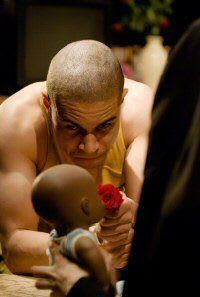Shelagh Stephenson developed The Long Road with the assistance of a group of serving prisoners under the auspices of the The Synergy Project and in collaboration with The Forgiveness Project.
The subject matter is painful enough for general audiences, the mindless murder of an intelligent 18 year old boy who had hopes of becoming a lawyer. It must have been 100 times harder to re-live for those involved in its creation from both sides of a divide symbolised by Katy McPhee's simple traverse design.
At one end of the stage we meet the bereft family - father, mother, son and urn. At the other is the murderer, also 18 but bucking the usual press stories about knife crime since she is neither black nor male
The link between them is Alison Newman's Elizabeth, a prison visitor who tries to understand and bring together the two parties to the crime.
Where Shelagh Stephenson takes an old story out of prospective predictability is with her empathy not only for the extreme reactions of those left behind when their son/brother is taken but also with Mary, outstandingly portrayed by Michelle Tate. She is inarticulate and, as we discover, illiterate, but her biggest problem is the childhood of depravity and deprivation that has moulded her.
Each member of Danny's family reacts differently to the shock of loss. Joe, who was with his brother in Soho when the murder took place, is the most mature despite his lip- and multiple ear-rings. While hard hit, the youngster played by one of theatre's upcoming stars, Steven Webb (recently seen in Sons of York) understands that life goes on.
Denise Black as his mother is torn between an urge to forgive and another to take an eye for an eye. Father (Michael Elwyn) may be intellectual and experienced but cracks up, using whisky to heal the pain when an injury prevents his constant, symbolic running.
Strangely, his addictive personality is mirrored in Mary, who claims to have been hooked on pretty much every questionable substance from the age of 8. She cannot even claim to have been the victim of a broken family, as there was never one to break.
However, while we learn much about the troublesome childhood that led her to murder and begin to take her side, every so often it is necessary to step back and remember the horrific and completely random crime that she has committed.
This is a great play that introduces a difficult subject in a manageable form. As well as playing at Soho, it has also made a tour of prisons. In this way, it might be one of those rare stage offerings that could change lives and, even more unusually, do so in two ways.
It has now become a worn out maxim that if criminals meet victims and/or their families they are more likely to reform. The corollary is also shown here to be significant - that cathartic healing might begin when a family can meet the person who deprived them of a relative.
Director Esther Baker does well, in the early stages keeping the two groups apart and then later allowing them to interact to great dramatic effect. The ending may seem overly sentimental but this 90 minute drama is an important work both for its stage presentation and the potential wider affect that it could have on our society.
Strong, compelling but heart-warming, The Long Road deserves to sell out once more and, if space can be found, a move to the larger theatre downstairs from this 90 seat rehearsal studio would be well-deserved.
Suman Bhuchar reviewed this production at its first showing at the Soho Theatre
